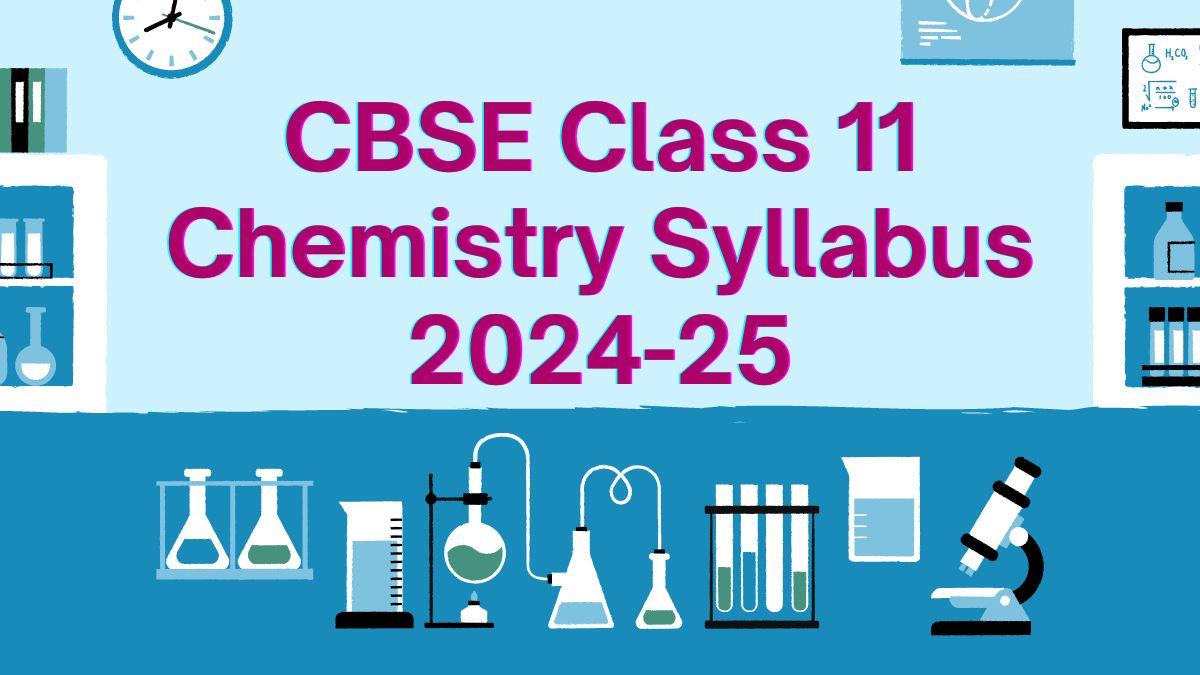The CBSE class 11 chemistry syllabus 2024-25 is the official documentation for students studying on class 11 while preparing for the final examinations scheduled in March 2025. To help students prepare for the annual exam earlier, the Central Board of Secondary Education has released the CBSE Class 11 chemistry syllabus 2024-25 online.
Students who are going to appear for the CBSE class 11 chemistry exam in this session can check the official syllabus on this page. Along with that, students can also review the paper pattern and marks weightage. The official syllabus PDF has also been provided in the article below.
CBSE Class 11 Chemistry Syllabus 2024-25
The CBSE Class 11 Chemistry Syllabus 2024-25 provides students with an overview of the course outline, encompassing all the topics and subjects to be covered in the academic year. Consulting the syllabus prior to starting your studies will enable you to efficiently manage your time and prioritize the more important sections. The CBSE class 11 chemistry syllabus consists of three sub domains: physical chemistry, inorganic chemistry and organic chemistry.
CBSE Class 11 Chemistry Syllabus 2024-25 Highlights
The paper code for the CBSE class 11 chemistry subject is 43. According to the latest syllabus, certain chapters and subjects were excluded. The section on experiments has been revised to incorporate additional real-world applications and contemporary usage.
Some additional topics have been included in the Chemistry Class 11 curriculum for 2024-25 to enhance the syllabus. Changes have been made to the grading system and evaluation structure to highlight critical thinking, understanding, and analytical abilities.
CBSE Class 11 Chemistry Paper Pattern 2024-25
The CBSE class 11 chemistry exam paper has the weightage of 70 marks. The rest of 30 marks is awarded on the basis of practical examination. The complete syllabus of chemistry class 11 has been divided into 9 units. Check the paper pattern below.
|
S. No.
|
Unit
|
Number of Periods
|
Marks
|
|
1.
|
Some Basic Concepts of Chemistry
|
12
|
7
|
|
2.
|
Structure of Atom
|
14
|
9
|
| 3. |
Classification of Elements and Periodicity in Properties
|
8
|
6
|
| 4. |
Chemical Bonding and Molecular Structure
|
14
|
7
|
| 5. |
Chemical Thermodynamics
|
16
|
9
|
| 6. |
Equilibrium
|
14
|
7
|
|
7.
|
Redox Reactions
|
6
|
4
|
| 8. |
Organic Chemistry: Some basic Principles and Techniques
|
14
|
11
|
|
9.
|
Hydrocarbons
|
12
|
10
|
|
Total
|
70
|
||
CBSE Class 11 Chemistry Detailed Syllabus 2024-25
Students of CBSE class 11 science stream can check the CBSE class 11 chemistry syllabus 2024-25 in detailed form below. The following syllabus is official and latest.
Unit I: Some Basic Concepts of Chemistry
General Introduction: Importance and scope of Chemistry. Nature of matter, laws of chemical combination, Dalton’s atomic theory: concept of elements, atoms and molecules. Atomic and molecular masses, mole concept and molar mass, percentage composition, empirical and molecular formula, chemical reactions, stoichiometry and calculations based on stoichiometry.
Unit II: Structure of Atom
Discovery of Electron, Proton and Neutron, atomic number, isotopes and isobars. Thomson’s model and its limitations. Rutherford’s model and its limitations, Bohr’s model and its limitations, concept of shells and subshells, dual nature of matter and light, de Broglie’s relationship, Heisenberg uncertainty principle, concept of orbitals, quantum numbers, shapes of s, p and d orbitals, rules for filling electrons in orbitals – Aufbau principle, Pauli’s exclusion principle and Hund’s rule, electronic configuration of atoms, stability of half-filled and completely filled orbitals.
Unit III: Classification of Elements and Periodicity in Properties
Significance of classification, brief history of the development of periodic table, modern periodic law and the present form of periodic table, periodic trends in properties of elements -atomic radii, ionic radii, inert gas radii, Ionization enthalpy, electron gain enthalpy, electronegativity, valency. Nomenclature of elements with atomic number greater than 100.
Unit IV: Chemical Bonding and Molecular Structure
Valence electrons, ionic bond, covalent bond, bond parameters, Lewis structure, polar character of covalent bond, covalent character of ionic bond, valence bond theory, resonance, geometry of covalent molecules, VSEPR theory, concept of hybridization, involving s, p and d orbitals and shapes of some simple molecules, molecular orbital theory of homonuclear diatomic molecules(qualitative idea only), Hydrogen bond.
Unit V: Chemical Thermodynamics
Concepts of System and types of systems, surroundings, work, heat, energy, extensive and intensive properties, state functions. First law of thermodynamics -internal energy and enthalpy, heat capacity and specific heat, measurement of U and H, Hess’s law of constant heat summation, enthalpy of bond dissociation, combustion, formation, atomization, sublimation, phase transition, ionization, solution and dilution. Second law of Thermodynamics (brief introduction) Introduction of entropy as a state function, Gibb’s energy change for spontaneous and nonspontaneous processes, criteria for equilibrium. Third law of thermodynamics (brief introduction).
Unit VI: Equilibrium
Equilibrium in physical and chemical processes, dynamic nature of equilibrium, law of mass action, equilibrium constant, factors affecting equilibrium – Le Chatelier’s principle, ionic equilibrium- ionization of acids and bases, strong and weak electrolytes, degree of ionization, ionization of poly basic acids, acid strength, concept of pH, hydrolysis of salts (elementary idea), buffer solution, Henderson Equation, solubility product, common ion effect (with illustrative examples).
Unit VII: Redox Reactions
Concept of oxidation and reduction, redox reactions, oxidation number, balancing redox reactions, in terms of loss and gain of electrons and change in oxidation number, applications of redox reactions.
Unit VIII: Organic Chemistry -Some Basic Principles and Techniques
General introduction, methods of purification, qualitative and quantitative analysis, classification and IUPAC nomenclature of organic compounds. Electronic displacements in a covalent bond: inductive effect, electromeric effect, resonance and hyper conjugation. Homolytic and heterolytic fission of a covalent bond: free radicals, carbocations, carbanions, electrophiles and nucleophiles, types of organic reactions.
Unit IX: Hydrocarbons
Classification of Hydrocarbons
Aliphatic Hydrocarbons: Alkanes – Nomenclature, isomerism, conformation (ethane only), physical properties, chemical reactions including free radical mechanism of halogenation, combustion and pyrolysis. Alkenes – Nomenclature, structure of double bond (ethene), geometrical isomerism, physical properties, methods of preparation, chemical reactions: addition of hydrogen, halogen, water, hydrogen halides (Markovnikov’s addition and peroxide effect), ozonolysis, oxidation, mechanism of electrophilic addition. Alkynes – Nomenclature, structure of triple bond (ethyne), physical properties, methods of preparation, chemical reactions: acidic character of alkynes, addition reaction of – hydrogen, halogens, hydrogen halides and water.
Aromatic Hydrocarbons: Introduction, IUPAC nomenclature, benzene: resonance, aromaticity, chemical properties: mechanism of electrophilic substitution. Nitration, sulphonation, halogenation, Friedel Craft’s alkylation and acylation, directive influence of functional group in monosubstituted benzene. Carcinogenicity and toxicity.
CBSE Class 11 Syllabus 2024-25 for Practical Exam
The CBSE class 11 practical examination will last for two hours and will be worth a total of 30 marks. Below is the assessment structure for the practical exam to assist students in comprehending it more effectively.
|
Evaluation Scheme for Examination
|
Marks
|
|
Volumetric Analysis
|
08
|
|
Salt Analysis
|
08
|
|
Content Based Experiment
|
06
|
|
Project Work
|
04
|
|
Class record and viva
|
04
|
|
Total
|
30
|
CBSE Class 11 Chemistry Syllabus 2024-25 PDF
The CBSE class 11 chemistry syllabus 2024-25 pdf is being provided below to assist students in a better way. Students should download the following PDF and go through each and every detail to excel in the upcoming examination. The following PDF is available for download for free.









 CUET General Test Syllabus 2026 (Latest)...
CUET General Test Syllabus 2026 (Latest)...
 CUET Chemistry Syllabus 2026, Download O...
CUET Chemistry Syllabus 2026, Download O...
 CUET Agriculture Syllabus 2026, Exam Pat...
CUET Agriculture Syllabus 2026, Exam Pat...









